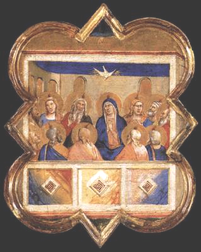Pentecost
'It will come to pass in the last days,' God says, 'that I will pour out a portion of my spirit upon all flesh. Your sons and your daughters shall prophesy, your young men shall see visions, your old men shall dream dreams. Indeed, upon my servants and my handmaids I will pour out a portion of my spirit in those days, and they shall prophesy. And I will work wonders in the heavens above and signs on the earth below: blood, fire, and a cloud of smoke. The sun shall be turned to darkness, and the moon to blood, before the coming of the great and splendid day of the Lord, and it shall be that everyone shall be saved who calls on the name of the Lord.'—Peter's Speech at Pentecost Acts 2:17-21; cf. Jl 3 |
 Pentecost (circa 1335-40) Taddeo Gaddi (b. 1300, Firenze, d. 1366, Firenze) |
731 On the day of Pentecost when the seven weeks of Easter had come to an end, Christ's Passover is fulfilled in the outpouring of the Holy Spirit, manifested, given, and communicated as a Divine Person: of His fullness, Christ, the Lord, pours out the Spirit in abundance.
1076 The Church was made manifest to the world on the day of Pentecost by the outpouring of the Holy Spirit. The gift of the Spirit ushers in a new era in the "dispensation of the mystery" – the Age of the Church, during which Christ manifests, makes present, and communicates His work of salvation through the Liturgy of His Church, "until He comes." In this age of the Church Christ now lives and acts in and with His Church, in a new way appropriate to this new age. He acts through the ![]() in what the common Tradition of the East and the West calls "the sacramental economy"; this is the communication (or "dispensation") of the fruits of Christ's Paschal mystery in the celebration of the Church's "sacramental" Liturgy.
CCC
in what the common Tradition of the East and the West calls "the sacramental economy"; this is the communication (or "dispensation") of the fruits of Christ's Paschal mystery in the celebration of the Church's "sacramental" Liturgy.
CCC
Copyright © 2019 Bert McNamee, Harleigh, Pennsylvania. All rights reserved.
 Sunday, November 16, 2025
Sunday, November 16, 2025




